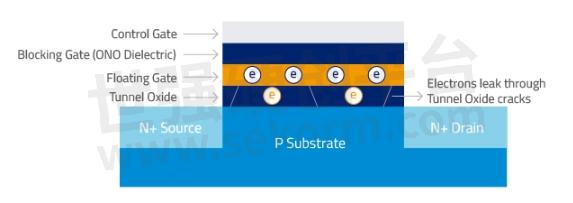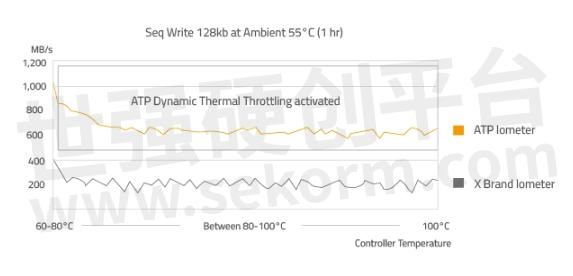How Temperature Affects Data Retention for SSDs




How Does High Temperature Affect Data Retention?
Flash wear in solid state drives (SSDs) is commonly attributed to usage or workload and endurance parameters are often expressed in program/erase (P/E) cycles. Another important, yet often overlooked, factor in SSD endurance is operating temperature. While continuously operating at very high temperatures, the SSD can degrade quickly. In a study held a few years ago, researchers found that "temperature has the most effect on data integrity" and "drives that ran hotter tended to fail the fastest" (Source: Digitaltrends). In settings where there could only be a handful of devices operating simultaneously for a number of hours at most, this heat issue may not be a big concern; but in environments like server farms where hundreds or thousands of devices are running at high speed and maximum performance 24/7, the temperature could go high enough to affect data retention. How can the integrity of data written on the flash drive be guaranteed at high operating or storage temperatures?
High-Temp Scenarios Affecting Data Retention
Prior to deployment, the SSD could lie dormant on a hot shelf for extended periods of time, causing concern that data or programs loaded before shipping will be lost. Since it is easier for electrons to enter or escape in hot temperatures and more difficult to enter or escape in cold temperatures it is best to store unused SSDs at low temperatures.
SSDs retain data by trapping and keeping electrons in the floating gate. Each cycle of electrons going in (programming) and out (erasing) wears out the tunnel oxide. While in use, SSDs subjected to high temperatures due to large workloads and poor thermal management can adversely impact data retention. Over time, when the tunnel oxide weakens, hot temperatures can cause electrons to leak out, resulting in higher bit errors. If there are too many bit errors, uncorrectable errors occur.

Figure 1. As flash wears out over time, extremely hot temperatures can cause electrons to leak out from the tunnel oxide.
Similarly, SSDs that have been in active use for several years and then stored in high temperatures over long periods of time will have data retention issues.
The JESD218B.01 standard, released by the JEDEC Solid State Technology Association, provides parameters for standardized endurance ratings, including retention requirements at certain temperatures. "This standard is based on use scenario where SSDs are actively used for some time, during which the SSDs are written to their endurance ratings, followed by a power-down time period in which data must be retained." (Source: JESD218B.01. ©JEDEC Solid State Technology Association. 2016. For endurance workload definitions of Client and Enterprise Class SSDs, please refer to JEDEC JESD219A.)
Client-Class SSDs typically used in a 40℃ environment actively for 8-hour periods, must be able to retain data for 1 year in a temperature rating of 30℃ after it is powered off.
Enterprise-Class SSDs typically operating at 55℃ for 24 hours a day should able to retain data for 3 months at 40℃ after it is powered off.
ATP Solutions for Better Endurance and Data Retention
ATP's industrial temperature-rated flash storage products have the ability to perform reliably within a wide temperature range of ‐40℃ to 85℃ and have higher endurance ratings surpassing typical endurance levels of other flash technologies.
Meticulous Validation and Characterization. Stringent quality screening and characterization at IC level and package design validation ensure the reliability of the new die. Complete module functionality tests are performed at the module level, while a 100% Rapid Diagnostic Test (RDT) during the pilot run ensures proven reliability at the mass production stage. RDT includes built-in self-test (BIST), wide temperature testing, and complete drive test including firmware, user, and spare areas.
Thermal Sensors and Dynamic Thermal Throttling. Embedded SSD modules are designed for high-speed, superior performance in compact systems with space limitations. Slim and pint-sized yet power-packed with features and capabilities, embedded SSDs could be prone to thermal issues especially when operating under high workloads. ATP's industrial-grade embedded SSDs are engineered for the toughest tasks under the most severe conditions.
To ensure outstanding performance and extended reliability in networking, enterprise, data center, and other industrial applications, these rugged SSDs (select models) feature temperature sensors to detect the temperature of the device and the controller. If temperatures reach threshold levels, the Dynamic Thermal Throttling mechanism is activated to prevent the SSD from overheating, automatically adjusting SSD performance to cool it down.
The ATP Dynamic Thermal Throttling mechanism smartly reduces heat without dramatic declines in performance, ensuring that the SSD continues to perform at optimal levels.

Figure 2. Even when ATP Dynamic Thermal Throttling is activated, ATP's 1 TB NVMe SSD performs two to three times better than other brands at its full strength. This clearly shows that there is no compromise in performance, unlike other solutions that drastically lower performance to reduce heat.
Long Reliability Ratings. ATP's industrial flash storage products are built to perform reliably over long periods of time. Mean Time Between Failures (MTBF) ratings of 5 million or 2 million hours (depending on the model) at 25℃ translate to many years of dependable use. All products are designed, screened, tested, and validated according to the strictest standards, from component to product level at ATP's own manufacturing and validation facilities.
Conclusion
As more and more organizations increasingly adopt SSDs as the storage of choice, they also seek more cost-effective ways to balance performance and cost. Many have turned to flash technologies that are capable of higher densities but often face performance, reliability, and endurance challenges and are typically unable to handle extreme temperatures.
ATP industrial SSDs are built to endure long years of dependable use and retain data even under tough operating conditions, workloads, and temperatures. For detailed information on ATP's industrial temperature solutions, visit the ATP website or contact an ATP Representative or Distributor in your area.
- |
- +1 赞 0
- 收藏
- 评论 0
本文由涂抹转载自ATP Blogs,原文标题为:How Temperature Affects Data Retention for SSDs,本站所有转载文章系出于传递更多信息之目的,且明确注明来源,不希望被转载的媒体或个人可与我们联系,我们将立即进行删除处理。
相关推荐
Benefits of ATP‘s Dynamic Over-Provisioning for SSDs
The ATP Dynamic OP solution breaks the mold by giving users the freedom and flexibility to configure SSDs according to the actual workloads of specific applications. Through ATP‘s simple software, users can freely and easily set the OP percentage from 7% to 14%, 28%, and 50%.
SSD Endurance: Challenges and Solutions
In this article, we will look at some factors affecting SSD life expectancy and how these can be addressed to manage SSD endurance.
SMART(世迈科技)DuraFlash™闪存产品选型指南
目录- Company Portfolio/Products Applications Flash Storage Product Introduction 2.5” SATA M.2 SATA mSATA Slim SATA M.2 PCIe NVMe U.2 PCIe NVMe EDSFF / U.2 PCIe NVMe (Enterprise and Data Center SSDs) BGA eMMC 5.1 Memory Cards CF Cards/CFast Cards eUSB Flash Drives/USB Flash Drives RUGGED SSD LINE-UP
型号- N200,R800,RU350,SP2800,S5E,RU150,T5E,M4,R800V,BGAE440,S1800,BGAE240,RD130M,ME2,M1HC,H9 CF,M1400,HU250E,M4P,T5EN,T5PFL,RU150E,N200V,T5PF,RD230M,MDC7000,XL+,RD230
ATP Launches Its Tiniest PCIe Gen3 x4 NVMe™ SSDs in M.2 Type 1620 HSBGA Package
ATP Electronics, the global leader in specialized storage and memory solutions, has announced the launch of its tiniest NVMe flash storage offering: the N700 Series PCIe® Gen3 x4 NVMe™ solid state drives (SSDs, which are available as M.2 Type 1620 heatsink ball-grid array (HSBGA) package.
MP3000 | PCIe NVMe | M.2 2280 & 22110 SSDs
型号- SRMP8240GFIN2BC3,SRMP8240GFCN2BC3,SRMP8960GF1N2AC3,SRMP1480GF2N2AC3,SRMP81920F1N2AC3,SRMP11920F1N2AC3,SRMP81920FCN2BC3,SRMP8240GF2N2AC3,SRMP8960GFIN2BC3,SRMP8960GFCN2BC3,SRMP81920F2N2AC3,SRMP8480GFIN2BC3,SRMP1240GF1N2AC3,SRMP11920F2N2AC3,SRMP81920FIN2BC3,SRMP8240GF1N2AC3,SRMP8480GF2N2AC3,MP3000,SRMP8960GF2N2AC3,SRMP1480GF1N2AC3,SRMP1960GF2N2AC3,SRMP8480GF1N2AC3,SRMP8480GFCN2BC3,SRMP1240GF2N2AC3,SRMP1960GF1N2AC3
ATP‘s Power Loss Protection Just Got Smarter with MCU-based SSD Design
ATP customers want constant assurance that power loss events will not cause massive downtime or lost data that could affect business operations and lead to higher operating costs. The MCU intelligently monitors sudden power failure conditions from a glitch to a surge or a complete outage...
The ATP Gym and Coach System: Exercising SSDs to Ensure Total Fitness
With the Gym and Coach system, ATP has dramatically improved RDT and the initialization process for functional test details. By making industrial SSDs undergo a lot of “painful” exercises through stringent testing, ATP makes sure that customers have everything to gain by receiving the most robust, reliable and enduring flash storage products for their applications.
The SP2800 PCIe NVMe M.2 2280 SSDs wth 3D NAND Technology and High Endurance
SMART‘s DuraFlash SP2800 products are best in-class PCIe NVMe SSDs with the functionality, performance and reliability for mission-critical applications.
SMART CP3000 PCIe NVMe M.2 2280 SSDs Feature a PCIe Gen4 X4 Interface and are Compliant to NVMe 1.4 Specification
The SMART CP3000 PCIe NVMe M.2 2280 SSDs feature a PCIe Gen4 x4 interface and are compliant to NVMe 1.4 specification. The increased bandwidth offered by PCIe 4.0 improves the efficiency of performing workloads.
SGM2535 2.7V to 18V eFuse with True Reverse Blocking and Device Sleep Support for SSDs
型号- SGM2535AL,SGM2535AXTSF20G/TR,SGM2535A,SGM2535ALXTSF20G/TR,SGM2535
How Over-provisioning Improves NAND-based ATP SSDs’Endurance and Performance
Over-provisioning (OP) provides additional space for garbage collection process of solid-state drives (SSDs), aids in improving the performance, and increases their endurance, hence contributing to extended drive life. This article ATP provides an in-depth view of OP and how its size affects the terabytes written (TBW), along with random write performance of SSDs.
DRAM-less Value Line SSDs Available in I-Temp/C-Temp Operable Models
型号- A600VC SERIES,N600VI,A600VI,A600VI SERIES,A600VC,N600VC SERIES,N600VC,N600VI SERIES
N700 Series PCIe® Gen3 x4 NVMe™ Type 1620 HSBGA SSDs:Tiniest NVMe Storage Solutions with Impressive Performance and Endurance
型号- N700PI,N700PC,N700,N700 SERIES
A750/A650, N750/N650 Series: New-Generation 3D TLC SSDs Deliver Near-SLC/MLC Endurance
型号- N750,A750PI,N750 MODEL,N750PI,N650 MODEL,N650,A650 SERIES,N650 SERIES,A750 SERIES,A650,A750,N650SI,N750 SERIES,N650SC,A650SI,A650SC
电子商城
服务
可烧录IC封装SOP/MSOP/SSOP/TSOP/TSSOP/PLCC/QFP/QFN/MLP/MLF/BGA/CSP/SOT/DFN;IC包装Tray/Tube/Tape;IC厂商不限,交期1-3天。支持IC测试(FT/SLT),管装、托盘装、卷带装包装转换,IC打印标记加工。
最小起订量: 1pcs 提交需求>
提供语音芯片、MP3芯片、录音芯片、音频蓝牙芯片等IC定制,语音时长:40秒~3小时(外挂flash),可以外挂TF卡或U盘扩容。
最小起订量: 1pcs 提交需求>


































































































































































































登录 | 立即注册
提交评论